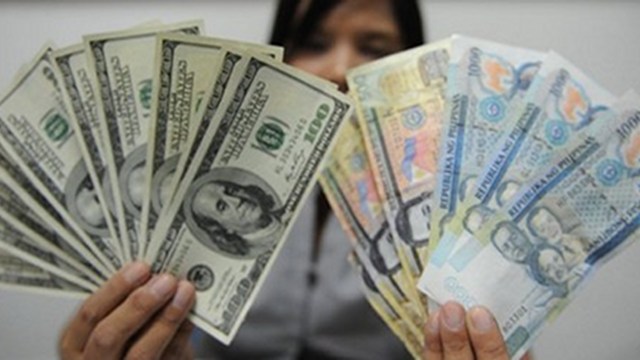SUMMARY
This is AI generated summarization, which may have errors. For context, always refer to the full article.

MANILA, Philippines – Amid high economic growth, the government remains vigilant against the appreciation of the peso, which is “threatening to erode our competitiveness.”
At a press conference on the Philippines’ third-quarter economic growth on Wednesday, November 28, Socioeconomic Planning Secretary Arsenio Balisacan told reporters the high gross domestic growth of 7.1% could also cause the peso to strengthen further against the US dollar.
This is something that the government is closely monitoring, he said.
“The slow recovery in the US economy continues to affect us negatively as their monetary authorities try to prop up their economy through quantitative easing. This, together with our strong macroeconomic fundamentals and good economic prospects, has resulted in the appreciation of our currency threatening to erode our competitiveness,” Balisacan said.
Balisacan said this is the reason why the government is keen on addressing the country’s infrastructure constraints.
“We have to be worried by the appreciation of the peso because it affects the lives of ordinary people, it affects employment,” Balisacan said. “But again, as the private sector invests in a massive way and the public sector gets traction in its infrastructure programs, that could help ease the appreciation of the peso.”
A strong peso, Balisacan explained, will:
- make Philippine-made products expensive abroad;
- erode the purchasing power of Overseas Filipino Worker (OFW) remittances;
- reduce exporters’ earnings;
- encourages the flow of hot money or investments in stocks and bonds; and
- threaten local firms’ earnings through cheaper imports.
National Economic and Development Authority (NEDA) Deputy Director General Emmanuel Esguerra also said at the sidelines of the press conference on Wednesday that managing the risks brought about by a strong peso entails lowering interest rates.
But he said this may not be enough considering that Bangko Sentral ng Pilipinas has already lowered policy rates thrice this year.
One other way that is being studied internally by the government, Esguerra said, is changing the composition of the country’s borrowings.
Esguerra said the Philippines’ current debt mix is at 80% domestic and 20% foreign. He said if the country’s local borrowing increases, there will be less demand for dollars moving forward.
“You borrow domestically, pay your foreign debts so the demand for dollars will [decline]. There are already discussions. At the moment its 80 [percent] local [borrowing] is not enough,” Esguerra explained.
Exporters hurting
Philexport President Sergio Ortiz-Luis told Rappler that there is no telling how many firms will be affected by the strong peso, which is now trading below 41 against the greenback.
Ortiz-Luis said many merchandise exporters are considering laying off workers or closing shops.
Some exporters who attended the Asian Development Bank forum on inclusive growth lamented their plight. Before 2008, exporters were getting paid in a matter of weeks after they ship their goods.
But after the crisis of 2009, exporters said they were now getting paid 30 to 60 days after they ship the orders. This has caused many of them to either close shop or increase their borrowings from the bank just to meet all their financial needs.
In the case of business process outsourcing firms, Ortiz-Luis said peso appreciation will not have an immediate impact since many of these firms have “adjustment clauses” in their contracts. He said however this arrangement may not hold forever and could send some of BPO clients looking elsewhere.
“If the peso hits a level of stronger than P42 to the dollar, they will close. But you cannot track all of them since many already closed during the crisis. Most of those who were affected were exporters of indigenous items,” Ortiz-Luis said.
In August this year, University of Asia and the Pacific economist Victor Abola said the government should allow the peso to depreciate by around 20 centavos every month until it reaches P50 to the dollar.
Abola said this is needed because he believes that the peso is overvalued by 20% to 30%. Export groups said this has caused half of the country’s small exporters to close shop. – Rappler.com
Add a comment
How does this make you feel?
There are no comments yet. Add your comment to start the conversation.